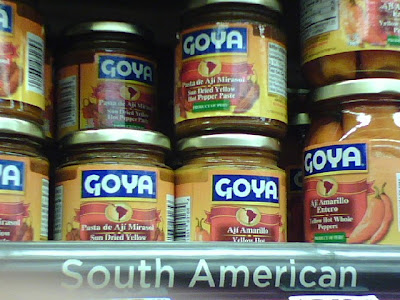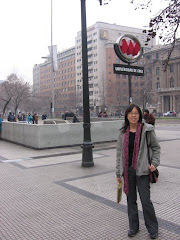An Atheist's Perspective on MissionariesSome of my friends have asked me, based on my personal experience, whether missionaries in Peru or other parts of the world are seen as imposing their Western Christian values on other parts of the world. While there is no doubt that this has happened in the past, and in some cases continues in the present, I have found in my personal experience in Mexico, Peru & Kenya, the reputation of Christian missionaries is often the opposite; when I told people I was a Christian or a missionary, they would usually brighten, open up, even increase their trust in me. I know in Latin America and other regions that are rife with corrupt institutions, the church and its representatives are more likely than gov't or private sectors to care for the poor, provide basic services like schools and clinics, and to treat people of low social standing as "brothers" and equals.
Here's a fascinating article written by a self-professed atheist, which speaks to the profound sense of empowerment and liberation that Christian theology can bring to the disenfranchised.
***
December 27, 2008
As an atheist, I truly believe Africa needs GodMissionaries, not aid money, are the solution to Africa's biggest problem - the crushing passivity of the people's mindset
by Matthew Parris
Before Christmas I returned, after 45 years, to the country that as a boy I knew as Nyasaland. Today it's Malawi, and The Times Christmas Appeal includes a small British charity working there. Pump Aid helps rural communities to install a simple pump, letting people keep their village wells sealed and clean. I went to see this work.
It inspired me, renewing my flagging faith in development charities. But travelling in Malawi refreshed another belief, too: one I've been trying to banish all my life, but an observation I've been unable to avoid since my African childhood. It confounds my ideological beliefs, stubbornly refuses to fit my world view, and has embarrassed my growing belief that there is no God.
Now a confirmed atheist, I've become convinced of the enormous contribution that Christian evangelism makes in Africa: sharply distinct from the work of secular NGOs, government projects and international aid efforts. These alone will not do. Education and training alone will not do. In Africa Christianity changes people's hearts. It brings a spiritual transformation. The rebirth is real. The change is good.
I used to avoid this truth by applauding - as you can - the practical work of mission churches in Africa. It's a pity, I would say, that salvation is part of the package, but Christians black and white, working in Africa, do heal the sick, do teach people to read and write; and only the severest kind of secularist could see a mission hospital or school and say the world would be better without it. I would allow that if faith was needed to motivate missionaries to help, then, fine: but what counted was the help, not the faith.
But this doesn't fit the facts. Faith does more than support the missionary; it is also transferred to his flock. This is the effect that matters so immensely, and which I cannot help observing.
First, then, the observation. We had friends who were missionaries, and as a child I stayed often with them; I also stayed, alone with my little brother, in a traditional rural African village. In the city we had working for us Africans who had converted and were strong believers. The Christians were always different. Far from having cowed or confined its converts, their faith appeared to have liberated and relaxed them. There was a liveliness, a curiosity, an engagement with the world - a directness in their dealings with others - that seemed to be missing in traditional African life. They stood tall.
At 24, travelling by land across the continent reinforced this impression. From Algiers to Niger, Nigeria, Cameroon and the Central African Republic, then right through the Congo to Rwanda, Tanzania and Kenya, four student friends and I drove our old Land Rover to Nairobi.
We slept under the stars, so it was important as we reached the more populated and lawless parts of the sub-Sahara that every day we find somewhere safe by nightfall. Often near a mission.
Whenever we entered a territory worked by missionaries, we had to acknowledge that something changed in the faces of the people we passed and spoke to: something in their eyes, the way they approached you direct, man-to-man, without looking down or away. They had not become more deferential towards strangers - in some ways less so - but more open.
This time in Malawi it was the same. I met no missionaries. You do not encounter missionaries in the lobbies of expensive hotels discussing development strategy documents, as you do with the big NGOs. But instead I noticed that a handful of the most impressive African members of the Pump Aid team (largely from Zimbabwe) were, privately, strong Christians. “Privately” because the charity is entirely secular and I never heard any of its team so much as mention religion while working in the villages. But I picked up the Christian references in our conversations. One, I saw, was studying a devotional textbook in the car. One, on Sunday, went off to church at dawn for a two-hour service.
It would suit me to believe that their honesty, diligence and optimism in their work was unconnected with personal faith. Their work was secular, but surely affected by what they were. What they were was, in turn, influenced by a conception of man's place in the Universe that Christianity had taught.
There's long been a fashion among Western academic sociologists for placing tribal value systems within a ring fence, beyond critiques founded in our own culture: “theirs” and therefore best for “them”; authentic and of intrinsically equal worth to ours.
I don't follow this. I observe that tribal belief is no more peaceable than ours; and that it suppresses individuality. People think collectively; first in terms of the community, extended family and tribe. This rural-traditional mindset feeds into the “big man” and gangster politics of the African city: the exaggerated respect for a swaggering leader, and the (literal) inability to understand the whole idea of loyal opposition.
Anxiety - fear of evil spirits, of ancestors, of nature and the wild, of a tribal hierarchy, of quite everyday things - strikes deep into the whole structure of rural African thought. Every man has his place and, call it fear or respect, a great weight grinds down the individual spirit, stunting curiosity. People won't take the initiative, won't take things into their own hands or on their own shoulders.
How can I, as someone with a foot in both camps, explain? When the philosophical tourist moves from one world view to another he finds - at the very moment of passing into the new - that he loses the language to describe the landscape to the old. But let me try an example: the answer given by Sir Edmund Hillary to the question: Why climb the mountain? “Because it's there,” he said.
To the rural African mind, this is an explanation of why one would not climb the mountain. It's... well, there. Just there. Why interfere? Nothing to be done about it, or with it. Hillary's further explanation - that nobody else had climbed it - would stand as a second reason for passivity.
Christianity, post-Reformation and post-Luther, with its teaching of a direct, personal, two-way link between the individual and God, unmediated by the collective, and unsubordinate to any other human being, smashes straight through the philosphical/spiritual framework I've just described. It offers something to hold on to to those anxious to cast off a crushing tribal groupthink. That is why and how it liberates.
Those who want Africa to walk tall amid 21st-century global competition must not kid themselves that providing the material means or even the knowhow that accompanies what we call development will make the change. A whole belief system must first be supplanted.
And I'm afraid it has to be supplanted by another. Removing Christian evangelism from the African equation may leave the continent at the mercy of a malign fusion of Nike, the witch doctor, the mobile phone and the machete.




